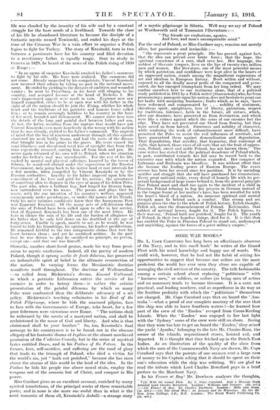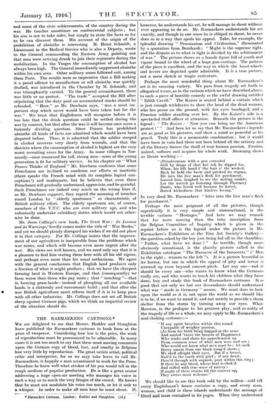SOME WAR BOOKS.*
Mn. L. COPE CORNFORD has long been an affectiOnate observer of the Navy, and in this small book 1 he writes of the Grand Fleet with his usual knowledge and happy use of words. We could wish, however, that he had not the habit of seizing his opportunities to suggest that because our sailors are the most proficient the world has ever seen they alone are capable of managing the civil services of the country. The talk fashionable among a certain school about replacing " politicians " with "business men," or soldiers, or sailors (as being men of action and no nonsense) tends to become tiresome. It is a cant, not practical, and leading nowhere, and as superfluous in its way as the fruitless prolixity with which the " politicians " themselves are charged. Mr. Cope Cornford says that on board the 'Aus- tralia '—what a proof of our complete mastery of the seas that this ship was able to leave Southern waters !—he learned how part of the crew of the ' Emden ' escaped from Cocos-Keeling Islands. When the ' Emden ' was engaged in her last fight with the ' Sydney ' some of the crew were still on shore. Seeing that they were too late to get on board the 'Emden,' they seized the yacht Ayesha,' belonging to the late Mr. Clunies-Ross, the owner of the islands, requisitioned stores, hoisted sail, and departed. It is thought that they fetched up in the Dutch East Indies. As an illustration of the quality of the class from which the men of the Commonwealth Navy are drawn, Mr. Cope Cornford says that the parents of one seaman sent a large sum of money to his Captain asking that it should be spent on their son's education while the ship was refitting. We are glad to read the tribute which Lord Charles Beresford pays in a brief preface to the Merchant Navy.
In his France at Bay= Mr. Dawbarn analyses the thoughts,
• (1) With the Grand Fleet. By L. Cope Cornford. And a Message from Admiral Lord Charles Beresford. London : Williams and Norgate. tad. net.] —(2) France at Bay. By Charles Hawbarn. London : Mills and Boon. (5s. net.]—(3) The Great War : its Lessons and its Warnings. By the la Hon. Jesse Ceilings, J.P., 3I.P. London : The Rural World Publishing Co. 12s. net.]
and some of the civic achievements, of the country during the war. He touches sometimes on controversial subjects ; but his aim is not to take sides, but simply to state the facts so far as he can discover them. His account of the origin of the prohibition of absinthe is interesting M. Henri Schmidt, a Lieutenant in the Medical Service who is also a Deputy, wrote to the General commanding the Eastern Army pointing out that men were arriving drunk to join their regiments during the mobilization. In the Vosges the consumption of alcohol has always been high. The General immediately suppressed absinthe within his own area. Other military zones followed suit, among them Paris. The results were so impressive that a Bill making it a penal offence to manufacture or sell absinthe was quickly drafted, was introduced in the Chamber by M. Schmidt, and was triumphantly carried. To the general astonishment, there was little or no protest. "The trade" accepted the Bill after stipulating that the duty paid on accumulated stocks should be refunded. "Here" as Mr. Dawbarn says, "was a most im- portant step which never would have been taken but for the war." We trust that Englishmen will recognize before it is too late that the drink question could be settled during the war by consent, but that after the war it will become once more a furiously dividing question. Since France has prohibited absinthe all kinds of facts are admitted which would have been disputed before. Thus, it is admitted that the soldier steeped in alcohol recovers very slowly from wounds, and that the districts where the consumption of alcohol is highest are the very worst recruiting areas for the Army. In some villages in Nor- mandy—once renowned for tall, strong men—none of the young generation is fit for military service. In his chapter on "What France Thinks of England" Mr. Dawbarn confesses that some Frenchmen are inclined to condemn our efforts as inartistic (there speaks the French mind with its complete logical con- ceptions !) and inadequate, but he believes that even these Frenchmen will gradually understand, appreciate, and be grateful. Such Frenchmen are indeed very much on the wrong lines if, as Mr. Dawbarn suggests, they regard the manning of trenches round London by "elderly sportsmen" as characteristic of British military effort. The elderly sportsmen are, of course, members of the V.T.C. who are over military age, and who voluntarily undertake subsidiary duties which would not other- wise be done.
Mr. Jesse Collings's new book, The Great War : its Lessons and its IVarnings,3 hardly comes under the title of" War Books," and yet we should plainly disregard his wishes if we did not place it in that category. For Mr. Collings insists that the improve- ment of our agriculture is inseparable from the problems which war raises, and which will become even more urgent after the wax. His views are well known, and we need only say that it is a pleasure to find him stating them here with all his old vigour, and perhaps even more than his usual enthusiasm. We agree with the general conclusions that English land produces only a fraction of what it might produce ; that we have the cheapest farming land in Western Europe, and that (consequently) we farm worse than those who pay more ; that "ranching "—that is, farming grass-lands—instead of ploughing all our available lands, is a slatternly and uneconomic habit ; and that after the
• war British agriculture must reform itself if it is to keep pace with all other industries. Mr. Collings does not set off British sheep against German pigs, which we think an impartial review of the situation should do.



































 Previous page
Previous page